Design for Accessibility: A Cultural Administrator's Handbook
Design for Accessibility: A Cultural Administrator's Handbook
Design for Accessibility: A Cultural Administrator's Handbook
You also want an ePaper? Increase the reach of your titles
YUMPU automatically turns print PDFs into web optimized ePapers that Google loves.
22 Chapter 2<br />
law. State and local laws may also permit lawsuits providing the<br />
successful party specific relief such as accommodations (e.g., assistive<br />
listening systems <strong>for</strong> individuals with hearing-loss or more integrated<br />
seating options <strong>for</strong> people who use wheelchairs and/or other mobility<br />
aids), as well as damages and the recovery of legal fees.<br />
• Building Codes may contain technical provisions related to construction,<br />
renovations and alterations. <strong>Cultural</strong> organizations must comply with<br />
building codes when they obtain building permits and certificates of<br />
occupancy.<br />
En<strong>for</strong>cement and Complaint Procedures<br />
There are consequences <strong>for</strong> noncompliance with access laws. Honest good<br />
faith ef<strong>for</strong>ts to comply with access laws and the treatment of all people with<br />
equality and dignity can help avoid complaints and lawsuits.<br />
When an organization applies to the NEA, the NEH, or to a local, state<br />
or regional arts agency or humanities council, it is required to sign an<br />
assurance or certification of compliance with federal nondiscrimination<br />
laws, including Section 504 of the Rehabilitation Act and the ADA. Various<br />
federal, state, local and regional agencies are responsible <strong>for</strong> en<strong>for</strong>cing<br />
these requirements.<br />
If an individual believes that an organization has discriminated on the<br />
basis of disability under:<br />
• Section 504 - they may file an administrative complaint with the federal<br />
or state agency that funded the organization;<br />
• Title I, II, or III of the ADA - they may file a complaint with the designated<br />
federal en<strong>for</strong>cement agency such as the Equal Employment Opportunity<br />
Commission or the Department of Justice, or under Titles II and III, they<br />
may skip the administrative complaint process and file a private lawsuit.<br />
“The major issue is accessibility with dignity. It is not enough to get into a<br />
building just any old way. I like to get into a building at the front with<br />
everybody else, where the rest of the society gets in.”<br />
Itzhak Perlman, violinist


